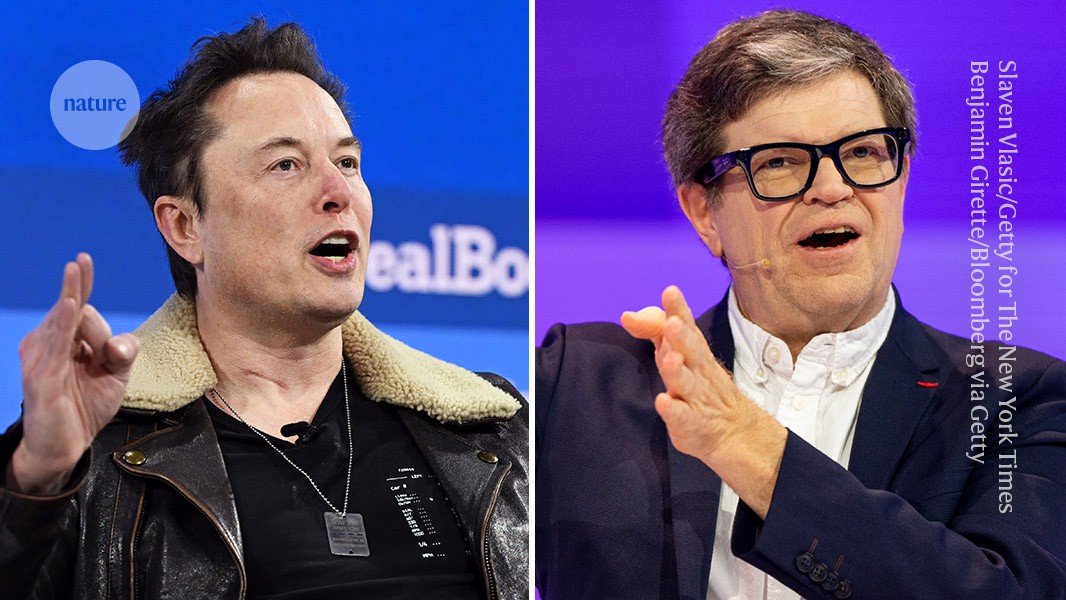What is science? Tech heavyweights brawl over definition

AI pioneer Yann LeCun and Elon Musk went head-to-head in a debate about modern research that drew thousands of comments

X owner Elon Musk (left) and artificial-intelligence pioneer Yann LeCun sparred on the social-media platform about scientific publications.Credit: Slaven Vlasic/Getty for The New York Times, Benjamin Girette/Bloomberg via Getty
If you do research and don’t publish it, is it science? That’s the question at the heart of an ongoing debate on X between Elon Musk and pioneering computer scientist Yann LeCun. Over the past few days, the conversation sprawled into a brawl about the definition of science, attracting thousands of commentators including researchers of all stripes who offered their opinions.
The discussion started on 27 May after Musk posted on X, formerly Twitter: “Join xAI if you believe in our mission of understanding the universe, which requires maximally rigorous pursuit of the truth, without regard to popularity or political correctness.” (Musk founded the company xAI to build to build artificial intelligence (AI) capable of enhanced reason technologies. Its first product is called Grok.)
LeCun, chief scientist at at tech giant Meta who is known for his foundational work in deep learning and neural networks called out Musk’s post, saying that he “claims to want a “maximally rigorous pursuit of the truth” but spews crazy-ass conspiracy theories on his own social platform”. It escalated quickly, with Musk questioning what science LeCun had done in the past 5 years. LeCun, who also holds an academic post in AI at New York University in New York City, replied: “Over 80 technical papers published since January 2022. What about you?”
LeCun then posted saying “if you do research and don’t publish, it’s not Science”. He argued that research is only ‘science’ when it is collected as a body of knowledge, tested for correctness and reproducibility, and then published. “Technological marvels don’t just pop out of the vacuum. They are built on years (sometimes decades) of scientific research,” he said. Without sharing that scientific information, “technological progress would slow to a crawl”.
LeCun’s definition of science sparked a backlash. Some people criticized him for not mentioning that science is often considered a method. Another, tech entrepreneur Palmer Luckey who developed the virtual-reality headset Oculus, condemned the idea that “people who don’t publish their research for peer review will die bitter and forgotten”. Others still argued that scientific experiments done in companies are often kept private, and even outside of the private sector 40% of data from academic and government scientists goes unpublished, according to some estimates.
“LeCun still misses the very essence of how science works. Saying ‘science is only science if it is published’ gatekeeps the idea that science is a method of understanding that people can use in their daily lives,” says Peter Coveney, a computer scientist at University College London.
The importance of feedback
LeCun later clarified his definition, posting: “science progresses through the collision of ideas, verification, analysis, reproduction, and improvements. If you don’t publish your research *in some way* your research will likely have no impact.”
He also hinted in his posts that there is need for more openness in research about AI, in particular the source code underlying networks. Coveney and philosopher of science Janet Stemwedel agree with LeCun on this point, especially amid criticisms that AI algorithms such as ChatGPT, Sora and AlphaFold3 are being developed and launched without the publication of their code.
“The big issue is that you need to expose your knowledge claims to rigorous examination, and you need to be responsive to the feedback that emerges from that,” says Stemwedel, who is at San José State University in California. She added that philosophers of science now see responsivity to feedback as a cornerstone of modern definitions of science, alongside principles such as the utility of science to make predictions and provide explanations.
Coveney pointed to the development of generalist AI tools, which aim to interpret data and produce advanced reasoning abilities. “At the heart of it is a large language model like ChatGPT, but they implement what’s called foundation models to solve problems.” He says that it’s questionable how scientific their methods are, even when their processes can be scrutinized by scientists.
xAI, for instance, is making its AI development open source. “Musk argues that we can provide scientific explanations by using explainable AI like xAI, thereby replacing conventional ways of doing science,” says Coveney. The problem is that a machine ingesting scientific literature and then creating statistical inferences does not confer understanding to the machine. It’s not an objective and rational way of creating scientific theories.”
Debated definition
The definition of science will always be contentious, says Stemwedel, who has studied how scientists use Twitter and X. Pre-Musk Twitter has had a beneficial role in overall discussions about science, where people showed that science could be responsive to feedback. “Early discussions showed objectivity is not a property of individual scientists, but rather of the collective efforts of a knowledge-building community. In the Musk era, I’m afraid things have gotten less responsive to reason.”
Amid the debates, Coveney says that it’s crucial to maintain the fundamental ideas of science that stem from the Enlightenment.
“The central element is if you can’t have an objective discussion then you’re not doing science, because you’re just articulating your opinions,” he says. The irony, adds Coveney, is that this is exactly what was happening on X.
doi: https://doi.org/10.1038/d41586-024-01626-z
This story originally appeared on: Nature - Author:Fred Schwaller


















